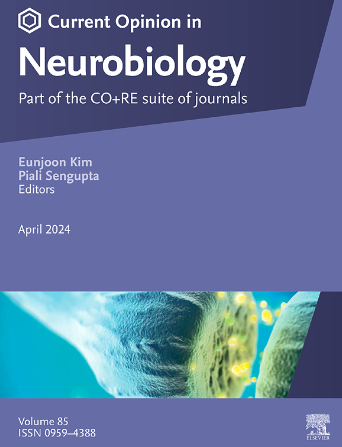小鼠亲代行为转变的神经基础。
IF 5.2
2区 医学
Q1 NEUROSCIENCES
引用次数: 0
摘要
亲代抚育对哺乳动物后代的身心健康至关重要。雌性动物经历怀孕、分娩和哺乳,在这些过程中至关重要的激素——如雌激素、催乳素和催产素——也在调节婴儿导向的照顾行为中起着重要作用。尽管不同物种中父亲的参与程度差异很大,但调节母亲转变的激素可能被用来促进父亲的行为适应。单细胞转录组学和细胞类型特异性遗传操作的最新进展已经阐明了激素与离散细胞类型相互作用的机制,从而驱动大脑中控制亲代行为的关键区域的结构和生理可塑性。此外,亲代抚育为研究自然发生的动机行为学习提供了一个有价值的模型,其中高阶认知区域和单胺能系统起着综合作用。本文综述了这一领域的最新进展,并简要讨论了特定激素系统潜在的两性二态参与。本文章由计算机程序翻译,如有差异,请以英文原文为准。
Neural basis for parental behavioral transitions in mice
Parental care is fundamental to the physical and mental well-being of mammalian offspring. Females undergo pregnancy, parturition, and lactation, with hormones pivotal to these processes—such as estrogen, prolactin, and oxytocin—also playing essential roles in mediating infant-directed caregiving behaviors. Although the extent of paternal involvement varies widely across species, the same hormones that regulate maternal transitions may be utilized to facilitate paternal behavioral adaptations. Recent advances in single-cell transcriptomics and cell-type-specific genetic manipulations have elucidated the mechanisms through which hormones interact with discrete cell types to drive structural and physiological plasticity within key regions of the brain governing parental behaviors. Furthermore, parental care serves as a valuable model for studying naturally occurring motivated behavioral learning, wherein higher-order cognitive regions and monoaminergic systems play an integrative role. This review highlights recent progress in this field, with a brief discussion on the potential sexually dimorphic engagement of specific hormonal systems.
求助全文
通过发布文献求助,成功后即可免费获取论文全文。
去求助
来源期刊

Current Opinion in Neurobiology
医学-神经科学
CiteScore
11.10
自引率
1.80%
发文量
130
审稿时长
4-8 weeks
期刊介绍:
Current Opinion in Neurobiology publishes short annotated reviews by leading experts on recent developments in the field of neurobiology. These experts write short reviews describing recent discoveries in this field (in the past 2-5 years), as well as highlighting select individual papers of particular significance.
The journal is thus an important resource allowing researchers and educators to quickly gain an overview and rich understanding of complex and current issues in the field of Neurobiology. The journal takes a unique and valuable approach in focusing each special issue around a topic of scientific and/or societal interest, and then bringing together leading international experts studying that topic, embracing diverse methodologies and perspectives.
Journal Content: The journal consists of 6 issues per year, covering 8 recurring topics every other year in the following categories:
-Neurobiology of Disease-
Neurobiology of Behavior-
Cellular Neuroscience-
Systems Neuroscience-
Developmental Neuroscience-
Neurobiology of Learning and Plasticity-
Molecular Neuroscience-
Computational Neuroscience
 求助内容:
求助内容: 应助结果提醒方式:
应助结果提醒方式:


